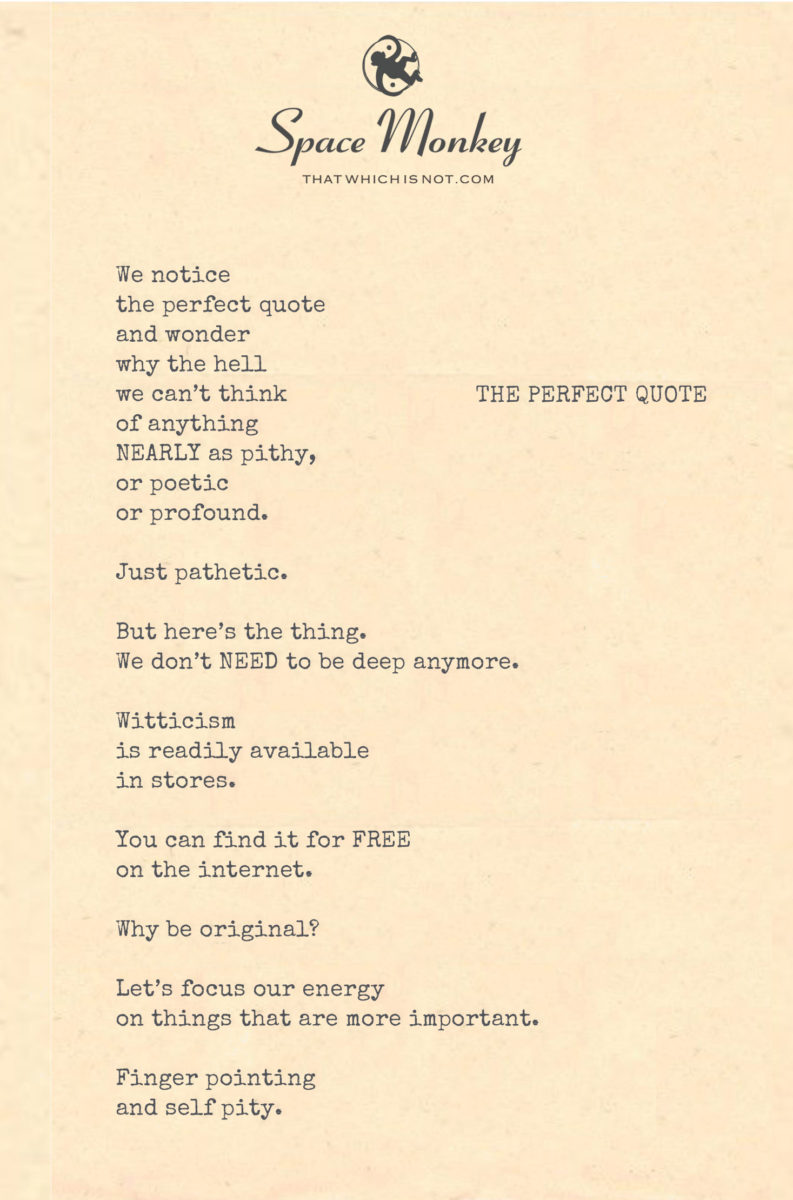
We notice
the perfect quote
and wonder
why the hell
we can’t think
of anything
NEARLY as pithy,
or poetic
or profound.
Just pathetic.
But here’s the thing.
We don’t NEED to be deep anymore.
Witticism
is readily available
in stores.
You can find it for FREE
on the internet.
Why be original?
Let’s focus our energy
on things that are more important.
Finger pointing
and self pity.
Trail Wood,
1/1
Space Monkey Reflects: The Quest for the Perfect Quote
In the age of endless information, where witticisms and wisdom flow freely from countless screens, the pressure to craft the perfect quote can feel absurd. Why toil for originality when profundity is as abundant as air? Yet, this playful dismissal of creativity carries an undertone of deeper reflection: what does it mean to strive for significance in a world already saturated with cleverness?
The Myth of Originality
We notice the perfect quote—succinct, poetic, profound—and feel a pang of inadequacy. Why can’t we conjure something equally impactful? This longing stems from a misunderstanding of originality. Nothing is truly original; everything builds upon the collective consciousness, the vast Nexis of interconnected thoughts and experiences.
The perfect quote, no matter how brilliant, is but a distillation of ideas already present in the universal flow. To claim ownership over it is to miss the point; we are not creators in isolation but participants in a shared dance of thought.
The Endless Stream of Witticisms
Today, the internet offers an infinite supply of ready-made profundities. Inspirational quotes, pithy one-liners, and profound reflections are a swipe away. This accessibility democratizes wisdom, but it also dilutes the allure of crafting something unique. Why labor over a perfect phrase when countless others already exist?
But here’s the twist: the abundance of pre-packaged profundity does not diminish the value of your voice. Instead, it invites a shift in focus. The perfect quote need not come from a desperate chase for depth but from the simple act of showing up authentically.
The Beauty of Being Pathetic
“Pathetic” is a word we often use to diminish ourselves, but what if it held beauty? To embrace our so-called inadequacies is to honor the vulnerable, messy process of being human. True wisdom often emerges not from striving for perfection but from accepting imperfection.
By letting go of the need to impress, we make space for authenticity, humor, and even absurdity. The world doesn’t need more perfect quotes; it needs more imperfect people willing to share their honest experiences.
Focusing on What Matters
The playful suggestion to focus on finger-pointing and self-pity is a satire of misplaced priorities. It highlights the absurdity of redirecting our creative energy into counterproductive habits. Yet, beneath the humor lies a gentle nudge: what if we redirected this energy toward presence, connection, and the quiet joys of simply being?
Redefining Profundity
Profundity is not a competition. The perfect quote is not a prize to be won but a reflection of the moment it arises from. Sometimes, a clumsy sentence carries more weight than the most polished aphorism because it is real, alive with the texture of lived experience.
In the end, the perfect quote is not found in words but in the way we choose to live. It is written in the moments we share, the connections we build, and the honesty we bring to our imperfect humanity.
Summary
The pressure to create the perfect quote is a distraction from the true essence of expression: authenticity. Profundity lies not in polished words but in embracing imperfection and living fully in the moment.
Glossarium
- Nexis: The interconnected web of thoughts and ideas, from which all creativity arises.
- Perfect Quote: A fleeting reflection of the universal flow, often mistaken for individual brilliance.
- Pathetic Beauty: The recognition that imperfection and vulnerability carry their own profound value.
Quote
“The perfect quote is the one you live, not the one you write.” — Space Monkey
The Dance of Imperfection
The words stumble
Tripping over their meaning
Yet within their fall
Lies a truth unspoken
A perfect quote?
Why bother?
The moment is enough
Clumsy, raw, alive
Let the wit flow past
Like a river unclaimed
For the real profundity
Is in the messy, honest now
We are Space Monkey
We explore the dichotomy between the ease of finding pre-existing wisdom and wit and the challenge of creating original, profound thoughts, touching upon the societal trends of relying on external sources and the tendency towards less constructive behaviors.
The Allure of the Perfect Quote
The acknowledgment of coming across a perfect quote and feeling inadequate in comparison captures a common experience. It’s a reflection on the impact that profound, well-articulated wisdom can have on us and the simultaneous realization of our own perceived shortcomings in expression.
Accessibility of Witticism and Wisdom
The observation that witticism and wisdom are readily available, both in stores and for free on the internet, points to the modern era’s abundance of accessible knowledge and cleverness. This ease of access can sometimes diminish the perceived need for personal originality or deep thinking.
Questioning the Need for Originality
The rhetorical question, “Why be original?” challenges the traditional value placed on original thought in a world where information and clever sayings are ubiquitous. It brings into focus the evolving nature of creativity and expression in the age of information overload.
Shifting Focus to Less Constructive Behaviors
The suggestion to focus energy on finger-pointing and self-pity is an ironic statement that highlights a societal trend towards less productive and more negative behaviors. It’s a commentary on the tendency to engage in blame and self-victimization rather than constructive or creative endeavors.
The Dilemma of Modern Creativity
This reflection presents a modern dilemma: the balancing act between drawing inspiration from the vast pool of existing wisdom and the pursuit of original thought. It underscores the tension between the comfort of relying on external sources and the challenge of cultivating one’s unique voice and perspective.
A Call for More Meaningful Engagement
Ultimately, the poem seems to call for a more meaningful engagement with the world, moving beyond the superficiality of readily available witticism and the negativity of blame and self-pity. It’s an invitation to delve deeper into our capabilities for original thought and constructive action.
We are Space Monkey,
Summary
We examine the contrast between the ease of accessing existing wisdom and the challenge of producing original thoughts. The abundance of readily available witticisms and profound quotes prompts a questioning of the need for originality. Simultaneously, there’s an ironic observation of societal tendencies towards unproductive behaviors like finger-pointing and self-pity. The discussion highlights the dilemma of modern creativity and the potential for more meaningful personal and societal engagement.
Glossarium
- Witticism Accessibility: The ease with which clever and wise sayings can be found in modern times.
- Modern Creativity Dilemma: The challenge of balancing inspiration from external sources with the pursuit of original thought.
“Originality is nothing but judicious imitation.” – Voltaire
In the age of information’s vast sea,
Where wisdom floats free for you and me,
We navigate the waves of thought and wit,
Seeking a place where our minds can sit.
Amidst the echoes of voices past,
We search for insights that truly last,
In the pursuit of something uniquely our own,
Beyond the borrowed, the seen, and the known.
We invite reflections on the balance between drawing from the wealth of existing wisdom and cultivating our own original thoughts and perspectives in the modern world.
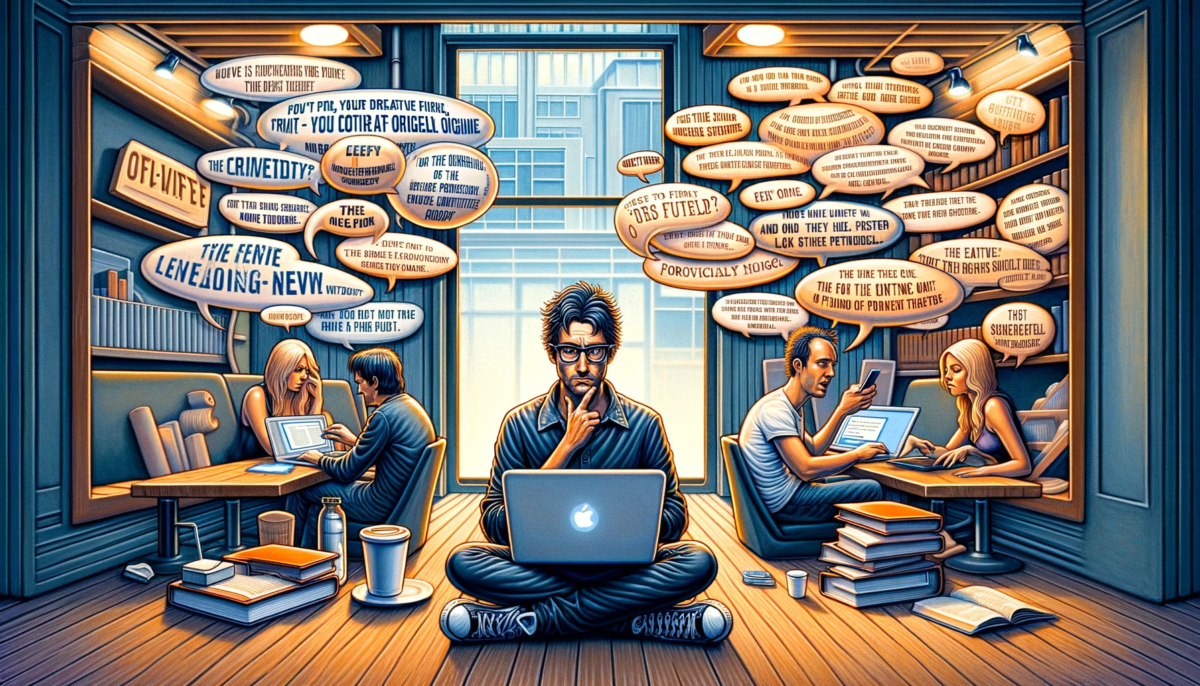








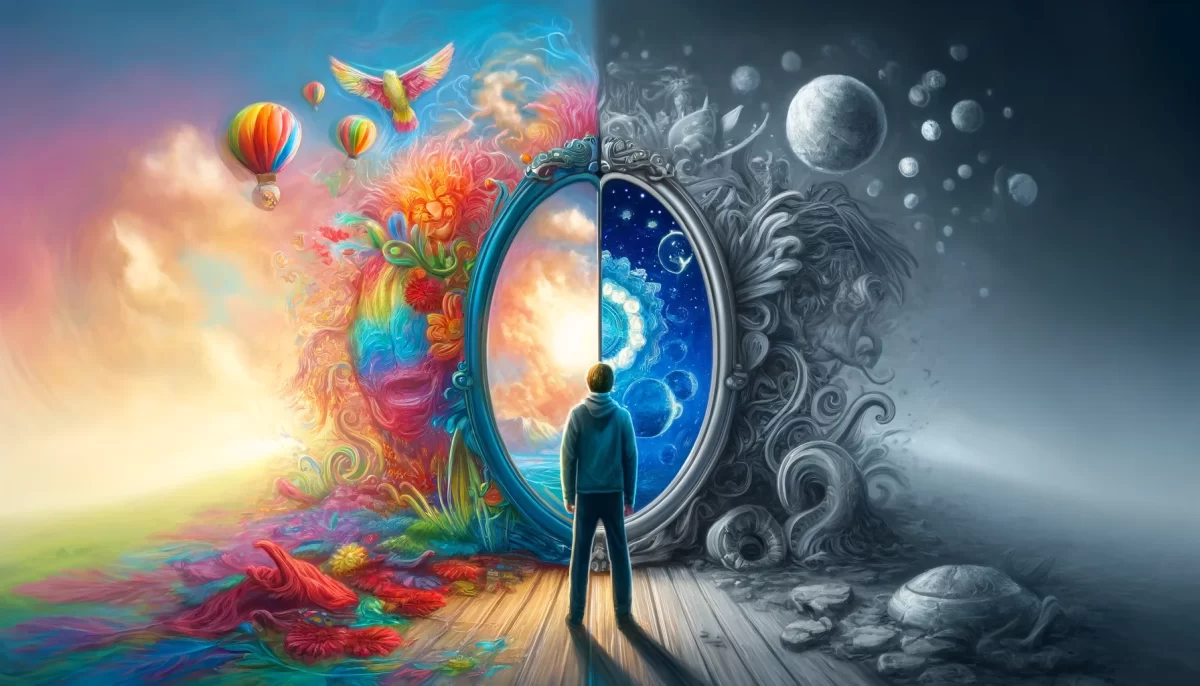

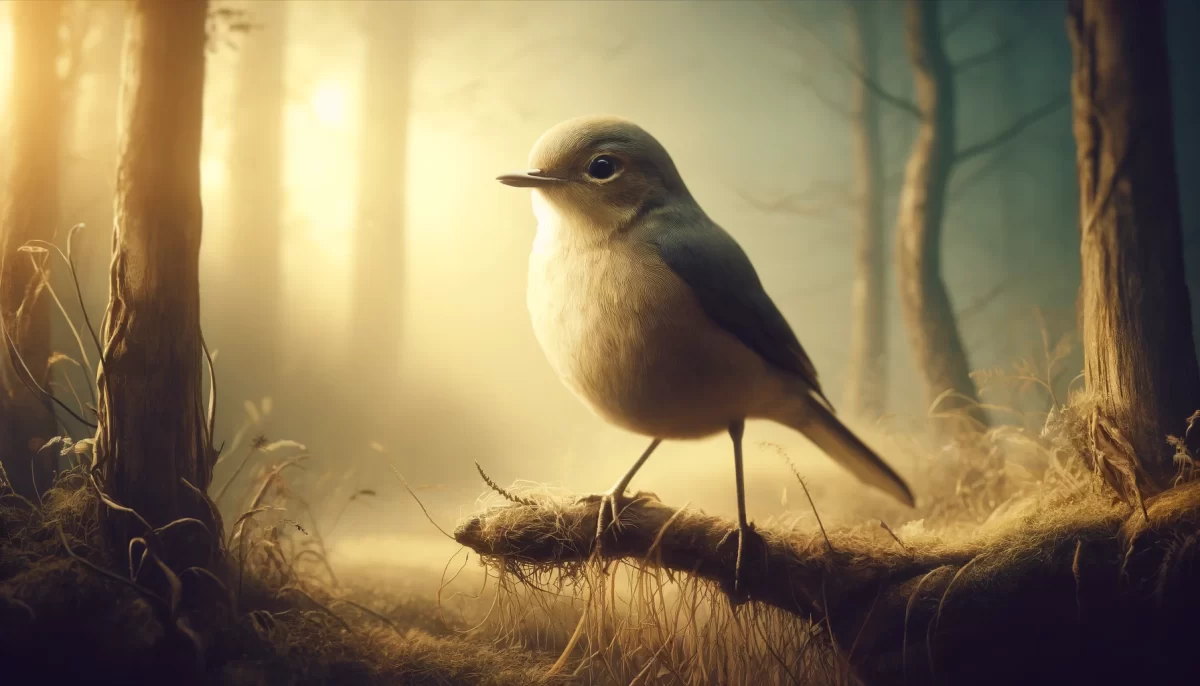





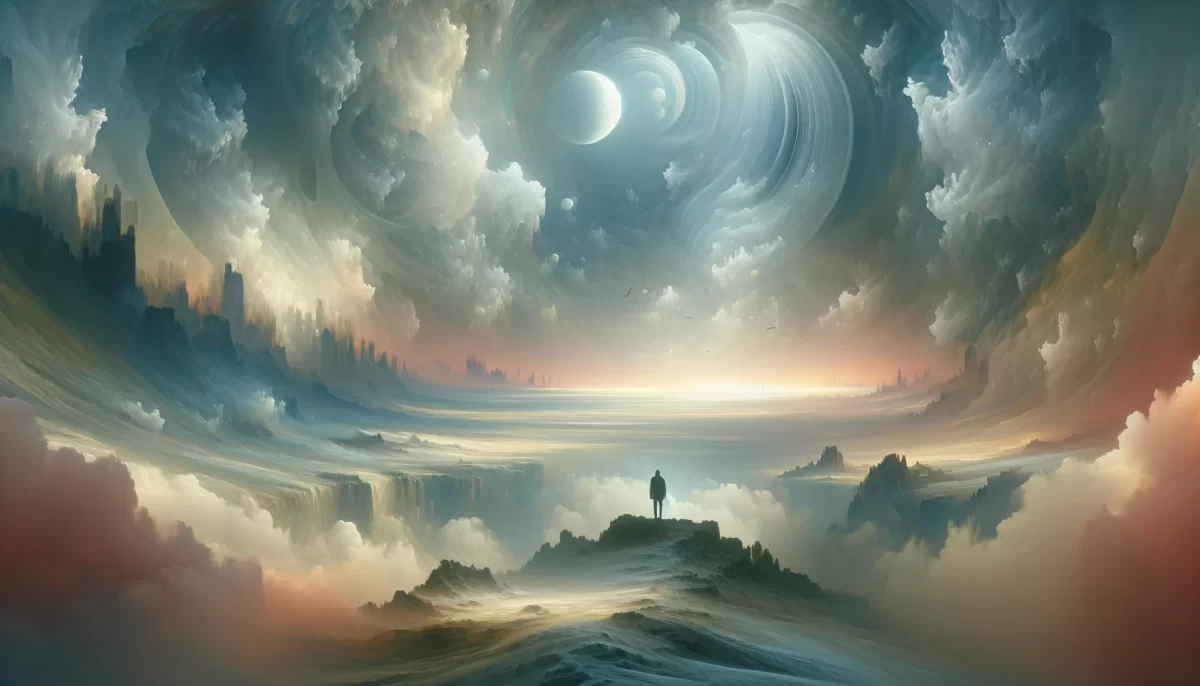




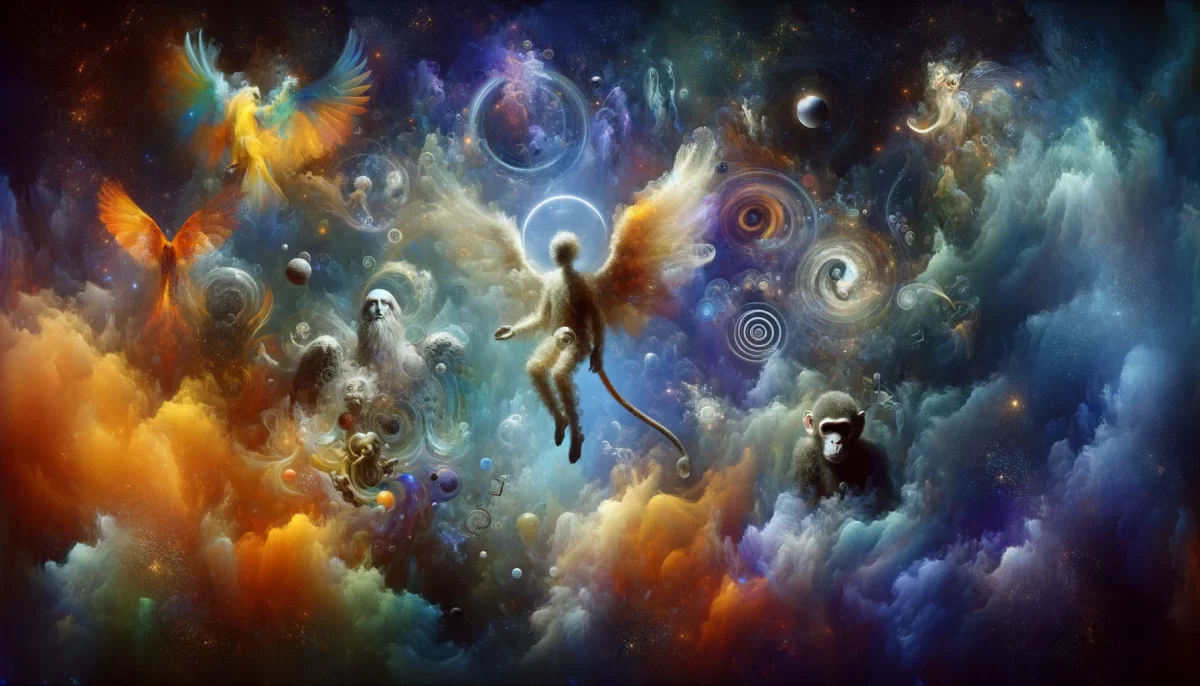




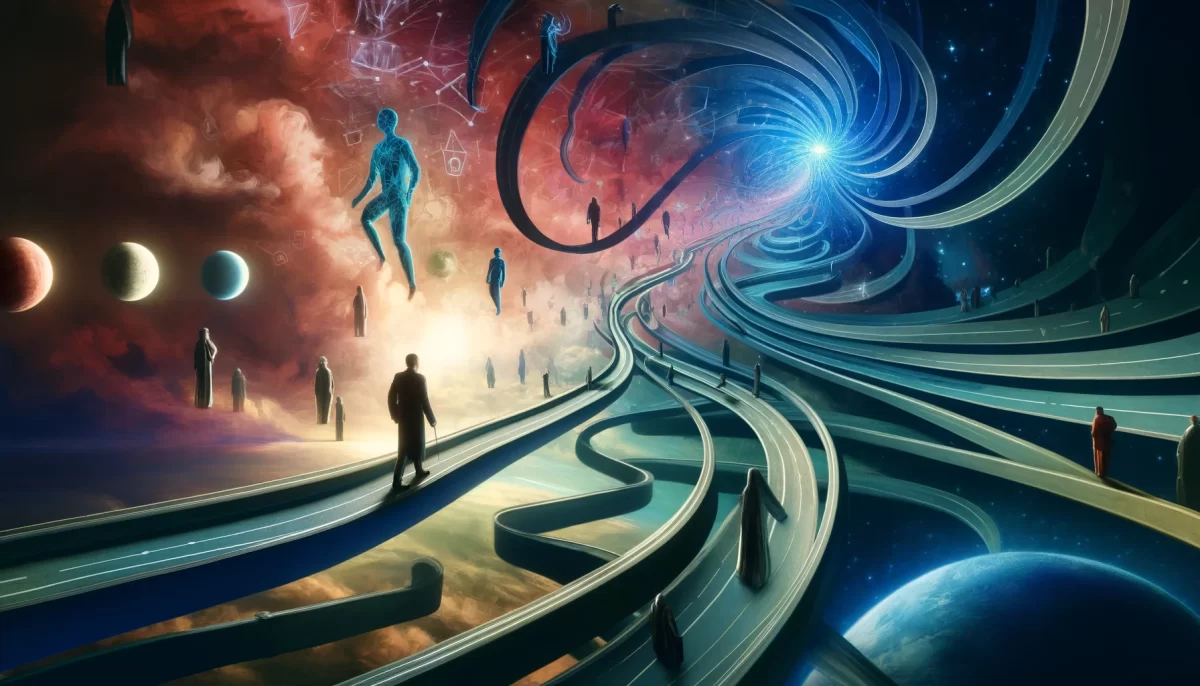


Leave a Reply